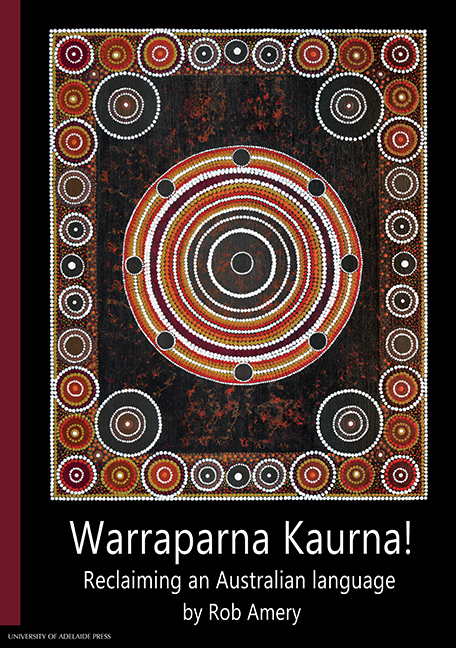Book contents
- Frontmatter
- Contents
- Maps, Plates, Graphs and Tables
- Preface to this Edition (2016)
- Foreword to the 2000 Edition
- Preface to the 2000 Edition
- Acknowledgements
- Abbreviations
- Conventions and Terminology
- Chapter 1 Locating the Study
- Chapter 2 Language Reclamation
- Chapter 3 An Ecological Approach to Language Revival
- Chapter 4 A Sociolinguistic History of Kaurna
- Chapter 5 Kaurna Sources
- Chapter 6 Restoring and Transforming the Kaurna Language
- Chapter 7 Kaurna Language Programs
- Chapter 8 Kaurna in Society
- Chapter 9 Kaurna Language Revival: The Formulaic Method
- Chapter 10 Sociopolitical Dimensions of Kaurna Language Revival
- Chapter 11 Into the Twenty-first Century: Developments since 2000
- Chapter 12 Summary and Conclusions
- Bibliography
- Index
Preface to this Edition (2016)
Published online by Cambridge University Press: 28 July 2017
- Frontmatter
- Contents
- Maps, Plates, Graphs and Tables
- Preface to this Edition (2016)
- Foreword to the 2000 Edition
- Preface to the 2000 Edition
- Acknowledgements
- Abbreviations
- Conventions and Terminology
- Chapter 1 Locating the Study
- Chapter 2 Language Reclamation
- Chapter 3 An Ecological Approach to Language Revival
- Chapter 4 A Sociolinguistic History of Kaurna
- Chapter 5 Kaurna Sources
- Chapter 6 Restoring and Transforming the Kaurna Language
- Chapter 7 Kaurna Language Programs
- Chapter 8 Kaurna in Society
- Chapter 9 Kaurna Language Revival: The Formulaic Method
- Chapter 10 Sociopolitical Dimensions of Kaurna Language Revival
- Chapter 11 Into the Twenty-first Century: Developments since 2000
- Chapter 12 Summary and Conclusions
- Bibliography
- Index
Summary
This book, Warraparna Kaurna!, is a revised paperback edition and ebook of the hardcover book Warrabarna Kaurna! originally published in Lisse, The Netherlands, in 2000. It is the chronicle of the early stages of the revival of a language that ceased to be spoken many years ago. This revival is based on historical documents, most of which were recorded in the period 1836-1858. Taking an ecological perspective, I trace the history of the language and all known sources. Since 2000, a few more minor sources have come to light and there is always the possibility of discovering something more in the future.
My analysis of Kaurna language revival here focuses primarily on the period 1990-1997 when I undertook intensive research for my PhD project completed in 1998. Kaurna language revival began with the writing of six songs in 1990. Since then, the language has developed considerably; Kaurna programs have been established and expanded across several institutions catering for a range of learners; increasingly, the language is being used in public by members of the Kaurna community; the range of functions for which the language is being used continues to expand; and there are early signs that the language is beginning to take root within Nunga households.
The study is part of a long-term ongoing project, where the ground is continually shifting. The use of and interest in the Kaurna language is gathering momentum and much has happened since 1997. Kaurna language reclamation is an exciting collaboration between Kaurna people, educators, linguists and others. This collaboration was solidified with the formation of Kaurna Warra Pintyandi (now Kaurna Warra Pintyanthi) (KWP) in 2002 and an incorporated Aboriginal organisation, Kaurna Warra Pintyanthi (KWK) in September 2013. Partnerships with a number of organisations have been formalised and agreements reached. Considerably more Kaurna language resources are now available to the learner or teacher of Kaurna. Developments since 2000 are discussed in more detail in Chapter 11 (pages 281-295).
Despite all these developments, we are still in the very early stages of Kaurna language revival. Will the Kaurna language take the ‘great leap forward’ and emerge as an everyday language within the Kaurna community? The signs that this might actually happen are certainly more positive than they were back in 2000.
- Type
- Chapter
- Information
- Warraparna Kaurna!Reclaiming an Australian language, pp. x - xviiiPublisher: The University of Adelaide PressPrint publication year: 2016



